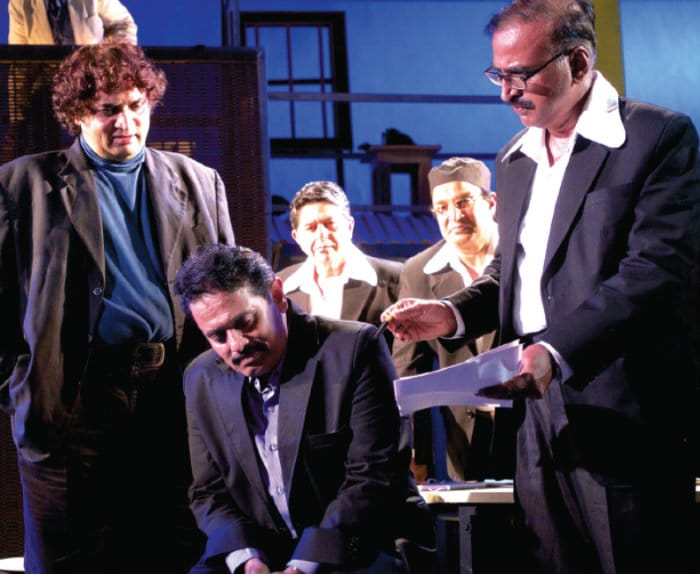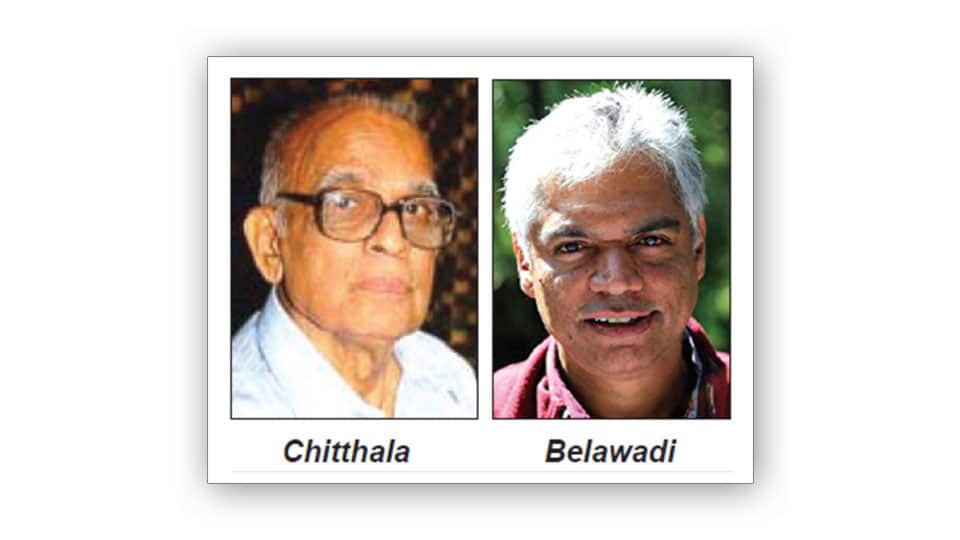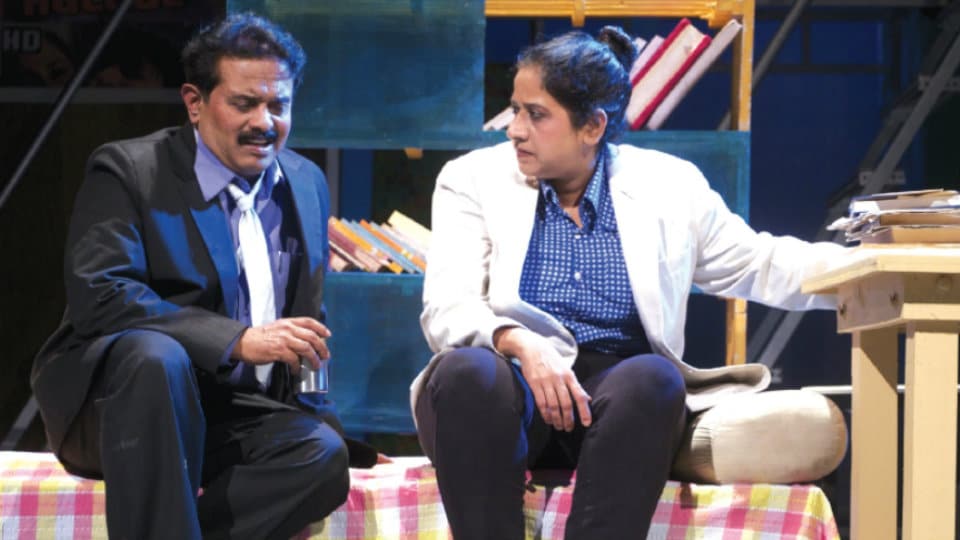Celebrated Novelist Yashwant Chitthala’s play ‘Shikari’ was staged as part of Rangayana’s weekend show at Bhoomigeeta last evening. The mid 1970s play, adapted and directed by Prakash Belawadi, is being staged at Rangayana since Aug.20. The next show will be on Oct. 22 (Sunday) at 6.30 pm.
In a short interaction, at Jaganmohan Palace in October 1994, Yashwant Vithoba Chittal (Chitthala), the eminent Kannada novelist told me that Nagappa’s character in Shikari in several ways is expected to demonstrate the meaninglessness of life, beyond the meaning one is willing to ascribe to it. Unlike Camus, for Chitthala it is that meaninglessness that constitutes the absurd which gets integrated into the worldview the novel ultimately provides. Besides, on first impression, Chitthala provides certain parallels with Kafka, in the suggestion that baffling complexities lurk behind a visibly spare narrative style and a general detachment that surrounds it.
The Rangayana Mysore repertory has senior actors who have been exposed to the best theatre in India and the West including off of Broadway (New York) have had the honour of presenting the finest fictional classics in Kannada with varying themes like Devanooru Mahadeva’s Kusumabale, U.R. Ananthamurthy’s Samakara, Ravindranath Tagore’s Gora, Shivarama Karanth’s Sarasammana Samadhi, Poornachandra Tejasvi’s Krishnegowdana Aane, and even Kuvempu’s Malegalalli Madumagalu.
Prakash Belawadi’s intervention in Rangayana has taken the institution to another milestone by bringing Chitthala’s Shikari on stage. The stage version written by Prakash Belawadi himself, provided the base for the August 20th production directed by Belawadi at Bhoomigeeta, Rangayana, Mysuru. The director and his team deserves a bouquet with several flowers of achievement in stage management, expertise of K.J. Pawan in providing lilting melodies to capture the times, the imaginative genius of Sankeerthi in costumes and the masterly work of Mahesh Kallatti in lighting.

Written in the 70s, the novel has lent itself to Prakash Belawadi’s capacity to tell a story in the language of theatre. In an astonishing manner with mind blowing theatrical effects and quaintly familiar music, Belawadi creates a world where man is demonised by vanities and the worship of money. As the director himself says, “the hunt is about a hunting party comprising friends, associates, social peers of caste and literary persuasion.” In his greed, man tortures the lives of others and grovels in joy. Chitthala brilliantly portrays the Bombay city of the 70s with its dehumanised corporate world where man is caught in the vicious circle of egoism, lust and heartless pursuit of money. In the depiction of Nagappa we see aspects other than father-hatred characteristic in Kafka’s works. His inspiration from Kafka and Camus is clear but the plot reveals Chitthala’s delightful originality. Perhaps Chitthala is Nagappa who recalls his childhood and later his struggles in Hyderabad and Mumbai and career as a chemist. But all through the lyrical narrative one feels the lurking presence of Chitthala’s love for creating a sanctuary of love and loneliness even in the streets of Bollywood.
The production which has texts from Chitthala’s work which run into long orations effectively develops the character of Nagappa. The stage setting brilliantly designed by Rangayana’s eminent designer H.K. Dwarakanath, which reminded me of a few broadway productions showed how local theatrical genius was able to transform it into Chawls of Bombay. The routine and the drudgery of life in tiny houses created on the stage revealed a stroke of genius. If Nagappa (masterfully portrayed by Hulugappa Kattimani) is on the stage from the beginning to the end, we must remember he is the protagonist revealing the novelist’s worldview in the existential settings of Bombay. Chitthala’s Nagappa is the Indian Sisyphus in Bombay pushing the boulder up the hill in vain. His end like all absurd anti-heroes, is in suicide. In a serious play like this, the repertory achieves another milestone in adding one more novelist to its list of successful productions. Nagappa reminded me of Ionesco’s The Lesson.
The two major issues of the fire accident which is used as a pretext to scapegoat Nagappa, by the corporate bosses and Srinivasa’s private life becoming a subject of Nagappa’s new story are integrated effortlessly. The director has deployed elements of a suspense thriller, the intrigues of the corporate world, honey traps, and journalism without a conscience, effectively. The audience enjoyed Srinivasa’s car driving and Nagappa’s flights with compromising air hostesses.

Gone are the days of Dr. Johnson who said “the drama’s rules, the drama’s audience give” but Belawadi has handled the plot and the dialogue in an exceptionally effective manner. He has effectively utilised Chitthala’s genius for drudging up almost as if in a mythical form the fears that afflict Bombay-wallahs. We can recognise them when Belawadi brings them up to the light of day with his astonishing stage directions. I was extremely impressed by almost meticulously detailed accounts of happenings within the three dimensions and the time element of everyday reality in a Bombay chawl. Belawadi makes room for providing the mind’s eye for us to see what is represented as occurring without any problem. The dialogue has followed all formal rules of syntax. The Kafkaesque narrator movingly portrayed by K.R. Nandini, is a strategy morally inescapable in bringing great fiction to the theatre. In short, the play effectively portrayed our world as a system incomplete in itself, traversed by fissures through which we glimpse something that for a moment seems to hold out the promise of a great justification of all things and ourselves. Chitthala reveals how that such a vision disappears and we retreat to the patchwork of immanence of mundane reality. Chitthala mocks at the claims of the mystics of religion. Belawadi succeeds in presenting the predicament of man in our urban society but one cannot ignore how in the ultimate analysis Chitthala finds essential meaninglessness as in Camus’ concept of the absurd.
It was an evening with a mature audience that Rangayana has created over the years, that I spent joyfully and thoughtfully when the words and scenes on the stage took me back and forth from the present to the past, strongly bringing back the memories of Samuel Beckett, Ionesco, Pinter and Kafka. I must frankly admit that the production was for the ‘highbrow’ audience and not for theatre goers who want thrilling entertainment and double entendre and even vicarious verbal sex on the stage. Full marks to Belawadi and each one in his troupe for taking the avowed agenda of Rangayana forward and creating a new milestone in Kannada theatre.
– Prof. B.N. Balajee








Recent Comments